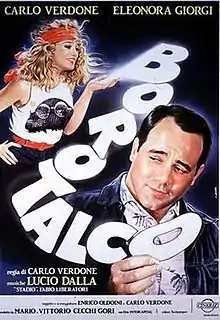Talcum Powder (film)
Talcum Powder (Original title: Borotalco) is a 1982 Italian comedy film written, starring and directed by Carlo Verdone.
| Talcum Powder | |
|---|---|
 | |
| Directed by | Carlo Verdone |
| Produced by | Mario Cecchi Gori Vittorio Cecchi Gori |
| Written by | Carlo Verdone Enrico Oldoini |
| Starring | Carlo Verdone Eleonora Giorgi |
| Music by | Lucio Dalla Fabio Liberatori Stadio (group) |
| Cinematography | Ennio Guarnieri |
| Edited by | Antonio Siciliano |
| Distributed by | Cecchi Gori Group |
Release date |
|
Running time | 96 minutes |
| Country | Italy |
| Language | Italian |
The film received multiple David di Donatello awards in Italy for Best Film, Best Actor, Best Actress, Best Score and Best Supporting Actor (to Angelo Infanti). It also won Silver Ribbons for Best Actress and for Best Score.[1][2]
Plot summary
Sergio Benvenuti (Carlo Verdone) is a meek and timid young man who works as a door-to-door salesman; naturally, his disposition makes incredibly hard for him to convince potential customers to subscribe to the offers he peddles.
Desperate to improve his sales' rate, he asks for the help of a more outgoing and successful colleague, Nadia, who agrees to take him with her to 'show him the ropes' of a successful sales pitch.
Due to a mishap Sergio reaches the abode of a colorful, over-the-top character, who introduces himself as 'Manuel Fantoni' and entertains him with tall tales about his life and his acquaintances which, apparently (due to the large number of signed photographs that adorn his house) include a veritable host of Italian and American celebrities from both music and cinema.
Oblivious of Nadia, Sergio is taken back to reality when the police arrives at the place, arresting 'Manuel' (who is revealed being actually named 'Cesare Cuticchia', a much-less-glamorous moniker) for a series of misdemeanors and taking him away.
Before being led away in manacles Manuel/Giuseppe, asks Sergio to 'keep an eye' on his house, at which the timid young man sees the chance to "impersonate" Manuel (which was an invented person, anyhow) to play, for once, the role of the uber-cool, mysterious and affluent romantic hero.
He sets his sights on Nadia, on which he already did develop a crush (which was the reason for asking her help in the first place), and he invites her to Manuel/Giuseppe's penthouse taking advantage of the fact that, having missed their business appointment, she has never seen him as 'Sergio'. While recounting her his own version of Manuel's tall tales...he tells her that he's a good friend of Lucio Dalla (at the time a hugely successful singer and performer in Italy) literally seeing the girl explode with joy.
Nadia is a huge fan of Dalla and would like to meet him and give him a few songs she has recorded, hoping to start a musical career. Caught in his own web of lies, Sergio doesn't dare to tell her the truth and rushes to the jail to talk to Giuseppe, hoping that he can help him securing a meeting with Dalla to satisfy the girl.
Giuseppe of course laughs at his request...the signed photos are all original but do hark back from a time when he owned a small restaurant frequented by actors and musicians, who often "paid" by leaving autographs magnifying the place and the "friendship" with Giuseppe. However the shrewd and cunning con-man urges Sergio to keep the pretense up in order to bed Nadia and then leave her, a perspective which intrigues and repels Sergio at the same time.
Sergio is engaged to Rossella, a plain girl of modest culture and little charm, who wants desperately to marry him. Sergio loathes the perspective, but he's in awe of her burly, coarse and violent father, Augusto (Mario Brega), so the idea of having a tryst with Nadia before the marriage looks to him like the 'last chance' of leading a carefree life before ending up "married with children".
The young man keeps playing the role of "Manuel", finding thin excuses for the delay of the meeting with Dalla which Nadia desires so much; in the end a romantic dinner with Nadia is crashed by the thunderous arrival of Augusto and Rossella which culminates in a beating during which his true identity is revealed.
Nadia leaves the premises; several years later Sergio will meet her again...each one seeing the other caught up in a life they don't enjoy...they finally exchange a deep, passionate kiss.
Cast
- Carlo Verdone: Sergio Benvenuti
- Eleonora Giorgi: Nadia Vandelli
- Christian De Sica: Marcello
- Angelo Infanti: Cesare Cuticchia alias Manuel Fantoni
- Roberta Manfredi: Rossella
- Mario Brega: Augusto
- Isa Gallinelli: Valeria
- Enrico Papa: Cristiano
See also
References
- Franco Montini. Carlo Verdone. Gremese Editore, 1997.
- Enrico Lancia. I premi del cinema. Gremese Editore, 1998. ISBN 88-7742-221-1.
